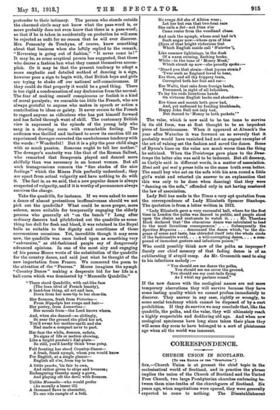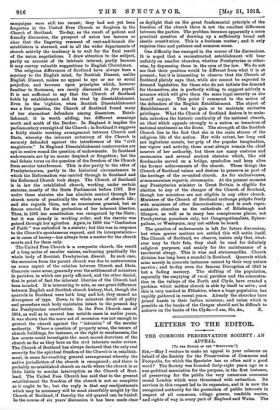CORRESPONDENCE.
CHURCH UNION IN SCOTLAND.
[To Tan EDITOR Or TEEM "SPECTATOR:] Sin,—Church Union is at present the chief topic in the ecclesiastical world of Scotland, and in practice the phrase implies the union of the Church of Scotland and the United Free Church, two large Presbyterian churches embracing be- tween them nine-tenths of the churchgoers of Scotland. Six years ago, when negotiations were opened, they were generally expected to come to nothing. The Disestablishment
campaigns were still too recent; they had not yet been forgotten in the United Free Church or forgiven in the Church of Scotland. To-day, as the result of patient and friendly discussion, the prospect of union has become so clear that the lingering remnant of root-and-branch dis- establishers is alarmed, and in all the wider departments of church activity the tendency is to wait for the final result of the union negotiations. I draw attention to the subject, partly on account of its intrinsic interest, partly because it may convey valuable suggestions to English Churchmen.
The religious differences of Scotland have always been a mystery to the English mind, for Scottish Dissent, unlike English Dissent, makes no appeal to eye or ear or social prejudice, and browses upon principles which, however familiar to Scotsmen, are rarely discussed in faro populi. It is not sufficient to say that the Church of Scotland holds by establishment and its rival by disestablishment. Even in the 'eighties, when Scottish Disestablishment was a live question, the Church of Scotland found many of her staunchest defenders among dissenters. Estab- lishment, it is worth adding, has different meanings north and south of the Border. In England it implies the parliamentary oversight of the Church ; in Scotland it suggests a fairly elastic working arrangement between Church and State, whereby the inherent autonomy of the Church is securely defended against the interference of the " civil magistrate." In England Disestablishment controversies are apt to centre round the question of endowments. In Scotland endowments are by no means despised or forgotten ; but the real debate turns on the question of the freedom of the Church from secular interference. This is due partly to the ethos of Presbyterianism, partly to the historical circumstances in which the Reformation was carried through in Scotland and the Reformed Church took shape. The Church of Scotland is in law the established church, working under certain statutes, mostly of the Scots Parliament before 1707. But under these statutes she has absolute oontrol through her church courts of practically the whole area of church life; and she regards them, not as concessions granted, but as fences erected for the protection of her inherent liberties. Thus, in 1592 her constitution was recognized by the State; but it was already in working order, and the statute was gained through her agitation. Again, in 1690 the " Confession of Faith " was embodied in a statute; but this was in response to the Church's spontaneous request, and its interpretation— as in cases of heresy—has always been a matter for the church courts and for them only.
The United Free Church is a composite church, the result of a long series of smaller unions, embracing practically the whole body of Scottish Presbyterian dissent. In each case, the secession from the parent church was due to controversies on some aspect of the relation between Church and State. Concrete cases arose, generally over the settlement of ministers in parishes, in which one party affirmed, and the other denied, that in point of fact the inherent liberties of the Church had been invaded. It is interesting to note, as one great difference between English and Scottish church history, that, though the quarrels in Scotland were both long and hot, they caused no divergence of type. Down to the minutest detail of polity and procedure each body maintains intact to the present day the Presbyterian constitution. In the Free Church case of 1904, as well as in several less notable cases in earlier years, it was shown that the mere act of secession was not enough to protect the church against the " intrusion" of the secular authority. Where a question of property arose, the tenure of church buildings, for instance, or the right to emoluments, the law courts could investigate the most sacred doctrines of the church so far as they bore on the civil interests under review. The Church of Scotland has always declared that the only real security for the spiritual freedom of the Church is in establish- ment, in some far-reaching general arrangement whereby the native jurisdiction of the church is recognized ; and there is probably no established church on earth where the church is so little liable to secular interruption as the Church of Scot. land. The United Free Church has said that in the present establishment the freedom of the church is not so complete as it ought to be ; but the reply is that any readjustments which may be necessary will be most cheerfully sought by the Church of Scotland, if thereby the old quarrel can be healed. In the course of six years' discussion it has been made clear as daylight that on the great fundamental principle of the freedom of the church there is not the smallest difference between the parties. The problem becomes apparently a mere practical question of drawing up a sufficiently broad and elastic constitution. This is a business matter; and it only requires time and patience and common sense.
One difficulty has emerged in the course of the discussions. It is urged that a reconstructed establishment will hear unfairly on smaller churches, whether Presbyterian or other- wise, by depressing them in the eyes of the law. We do not see that their position would be different from what it is at present ; but it is interesting to observe that the Church of Scotland plainly says that, while she cannot be expected to demand legislation for those who do not initiate the demand for themselves, she is perfectly willing to support actively a measure which will give them the same legal security as she herself enjoys. This point I commend to the notice of the defenders of the English Establishment. The object of Establishment is not to gain or to maintain exclusive privileges. What the Church of Scotland desires is to main- tain unbroken the historic continuity of the national church, an ideal which appeals strongly to a nation so tenacious of national sentiment as the Scots. The strength of the Scottish Church lies in the fact that she is the main stream of the religious life of the nation. Her wide extent, her long and not inglorious annals, her grip of the popular imagination, her vigour and activity, these must always remain the chief sources of her authority, but there are many customs and ceremonies and several ancient statutes which, like old floodmarks carved on a bridge, symbolize and keep alive the former achievements of the church. These things the Church of Scotland values and desires to preserve as part of the heritage of the re-united church. As for exclusiveness, si monument um requiris, circumspice. At the present moment any Presbyterian minister in Great Britain is eligible for election to any of the charges of the Church of Scotland, though her ministers are not eligible in any other church. Ministers of the Church of Scotland exchange pulpits freely with ministers of other denominations ; and in such repre- sentative churches as the cathedrals of Edinburgh and Glasgow, as well as in many less conspicuous places, not Presbyterian preachers only, but Congregationalists, Episco- palians, or Wesleyans, may not seldom be heard.
The question of endowments is left for future discussion; but when graver matters are settled this will settle itself. The Church of Scotland, we observe, insists only that, what- ever may be their fate, they shall be used for definitely religious purposes, and mainly for the maintenance of a territorial clergy. This is wise and statesmanlike. Church division has long been a scandal in Scotland. Quarrels which arise merely in concrete instances cannot by their very nature survive ; and to-day even the famous Disruption of 1843 is but a fading memory. The shifting of the population, especially the emptying of rural parishes and the concentra- tion in the valleys of the Forth and Clyde, have created a problem which neither church is able by itself to solve ; and this is very marked in Fifeshire, where a huge population has rapidly gathered in recent years. Already the churches have joined hands in their Indian missions ; and union which is possible on the banks of the Ganges should not be difficult to achieve on the banks of the Clyde.—I am, Sir, &c., X.



















































 Previous page
Previous page